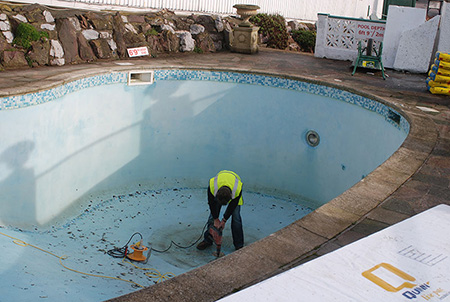Whether you're a proud pool owner or a maintenance professional, keeping your pool in top condition is essential for maximum enjoyment. Over time, wear and tear can take its toll on your beloved aquatic oasis, and that's where pool repair comes in. From minor leaks to faulty equipment, addressing these issues promptly is key to preserving the smooth waters of your pool. In this article, we will dive deep into the world of pool repair, exploring useful tips and insights to help you tackle these common challenges head-on. So, grab your tools and let's get ready to make your pool sparkle once again!

1. Identifying Common Pool Issues
Leaks: One of the most common issues faced by pool owners is leaks. A leaking pool can lead to a significant loss of water and may result in costly water bills. To identify if your pool has a leak, pay attention to any significant drops in water level or signs of water accumulation around the pool. A professional pool repair service can conduct a thorough inspection to locate and fix the leaks.
Cracked Tiles: Cracked or broken tiles not only diminish the aesthetic appeal of your pool but can also pose safety risks. Inspect your pool's tiles regularly and look for any signs of damage. Cracks or loose tiles should be addressed promptly to prevent further deterioration and potential injury to swimmers.
Equipment Malfunction: Pool equipment, such as pumps, filters, and heaters, can experience malfunctions over time. Keep an eye out for unusual noises, reduced water circulation, or inconsistent water temperature, as these may indicate equipment issues. pool repair Boca Raton and servicing can help prevent equipment failures and ensure a smoothly functioning pool.
Remember, identifying common pool issues early on is crucial to prevent further damage and costly repairs. By promptly addressing any problems, you can enjoy a well-maintained swimming pool throughout the year.
2. DIY Pool Repair Tips
Identify the Problem Early: Regularly inspect your pool for any signs of damage or issues that may need repair. Look out for cracks in the pool walls or floor, leaks around the pool fittings, or any malfunctioning equipment. Catching these problems early will prevent them from escalating into larger and more costly repairs.
Patching Small Cracks: If you notice small cracks in your pool, you can easily patch them yourself. Start by draining the pool to the level of the crack. Clean the area thoroughly using a wire brush to remove any loose debris or paint. Apply a pool repair patching compound, following the manufacturer's instructions. Smooth it out evenly and let it cure before refilling the pool.
Fixing Leaks: Leaks can significantly affect your pool's water levels and lead to water wastage. To fix leaks in your pool, start by identifying the source of the leak. Check for any visible leaks around the pool fittings, pipes, or the pool shell. Once you locate the leak, you can either use a pool repair epoxy or a pool leak sealant to plug it. Again, follow the manufacturer's instructions for proper application.
Remember, while some pool repairs can be done on your own, it's important to know your limits. If you come across complex or extensive issues, it's best to seek professional help to ensure the safety and integrity of your pool. Proper maintenance and swift repair actions will keep your pool in top shape and prolong its lifespan.
3. When to Call a Professional
If you are facing complex or major pool repairs, it is crucial to understand when it's time to call in a professional. While some smaller repairs can be handled independently, certain issues require the expertise and knowledge of a certified pool repair specialist.
Firstly, any electrical matters concerning your pool should always be addressed by a professional. Working with water and electricity can be extremely dangerous, and attempting to fix electrical problems yourself can result in severe consequences. To ensure the safety of yourself and others, it is best to leave these types of repairs to the experts.
In addition, if you notice significant structural damage in your pool, it's wise to consult a professional. Cracks, leaks, or other forms of deterioration can lead to further problems if not properly addressed. A pool repair specialist will have the necessary tools and experience to properly assess the damage and provide appropriate solutions.
Lastly, complicated mechanical repairs should not be attempted without the help of a professional. Issues with your pool's filtration system, water pump, or heating system require specific knowledge and expertise. Trying to fix these problems without the necessary skills may result in further damage and costly repairs down the line.
Remember, when it comes to more complex pool repairs involving electrical, structural, or mechanical components, it is always best to seek the assistance of a professional to ensure the job is done safely and effectively.
